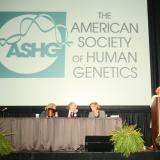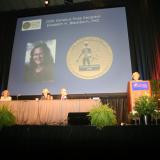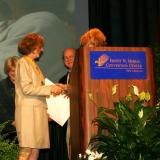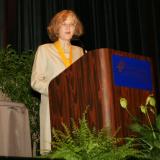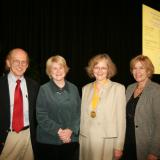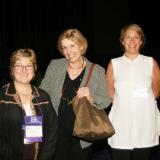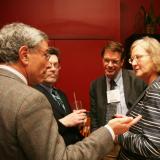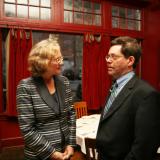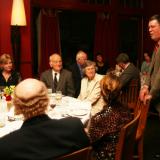2006 Gruber Genetics Prize
Dr. Elizabeth H. Blackburn has been honored for her achievements in research and in science advocacy. Her work on telomeres and the enzyme responsible for making them -- telomerase -- has led to new insights concerning the genome and enabled novel approaches to drug development for cancer.
2006 Genetics Prize Recipient
Laureate Profile
"Elizabeth Blackburn has transformed our understanding of how cells age and die. And she has acted as a true citizen scientist, working to ensure that public debate on the impact of science on society is well informed and grounded in fact," said Peter Gruber.
Elizabeth Blackburn is the Morris Herzstein Professor of Biology and Physiology in the Department of Biochemistry and Biophysics at the University of California, San Francisco.
In the 1970s, Blackburn showed how, as our cells divide and grow, our DNA is safely copied and protected. Each chromosome is capped with a telomere – a small DNA cap that protects the ends from damage. She and her colleagues then went on to discover telomerase, the enzyme that repairs the telomeres, and demonstrated the role it plays in normal cells, cancer cells and aging.
They found that telomerase ‘keeps DNA young'. Those cells without telomerase will eventually die.
"Although telomerase activity is normally kept in check in adult human cells, throughout life a certain level of telomerase is still required for replenishment of tissues, such as the immune system," says Blackburn.
Recently she and her University of California, San Francisco colleagues, including Elissa Epel, showed that low telomerase in white blood cells was associated with six of the known major risk factors for cardiovascular disease.
But it's not always good for a cell to stay young. Many cancer cells are overly rich in telomerase. "Knocking down the high telomerase in cancer cells also inhibited their growth surprisingly rapidly," says Blackburn.
Not only has Blackburn opened up a vast field of research," says Peter Gruber. "She has also fought against the politicization of science." In 2001 Blackburn was appointed to President Bush's Council on Bioethics only to be dismissed in 2004 over her insistence that the council's reports should incorporate the best possible scientific information.
Shortly after her dismissal, Blackburn said, "As a naturalized citizen of the United States, I have an immigrant's love for our country. But our country must not fail us. Scientific advice should and must be protected from the influence of politics." Blackburn, still also an Australian citizen, was born in Tasmania, Australia.
Citation
The 2006 Genetics Prize of the Peter Gruber Foundation is hereby proudly presented to Elizabeth H. Blackburn, PhD for telomeres and telomerase.
The Prize recognizes her achievements in research and science advocacy.
By discovering the unique structure and mechanism of replication of telomeres, the ends of chromosomes, Dr. Blackburn demonstrated that these genetic elements play a fundamental role in normal development, and in carcinogenesis.
She characterized telomerase, the enzyme responsible for making telomeres, in normally aging cells, in cancer cells, and in stem cells, enabling the development of new drugs based on these biological roles.
Her accuracy and honesty in debates on therapeutic cloning and stem cell research have raised public awareness of the importance of this work and are a model for the role of the scientist as citizen.



